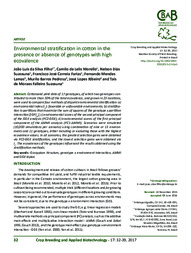Environmental stratification in cotton in the presence or absence of genotypes with high ecovalence.
Environmental stratification in cotton in the presence or absence of genotypes with high ecovalence.
Author(s): SILVA FILHO, J. L. da; MORELLO, C. de L.; SUASSUNA, N. D.; FARIAS, F. J. C.; LAMAS, F. M.; PEDROSA, M. B.; RIBEIRO, J. L.; SUASSUNA, T. de M. F.
Summary: Cottonseed yield data of 17 genotypes, of which two genotypes contributed to more than 30% of the total ecovalence, and grown in 23 locations, were used to compare four methods of disjoint environmental stratification: a) environmental index (Ie): favorable or unfavorable environments; b) stratification in partitions that maximize the sum of squares of the genotype x partition interaction [(GP)m]; c) environmental scores of the second principal component of the GGE analysis (PC2-GGE); d) environmental scores of the first principal component of the AMMI analysis (PC1-AMMI). Scenarios were simulated (10,000 simulations per scenario) using combination of nine or 13 environments and 11 genotypes, either including or excluding those with the highest ecovalence values. In all scenarios, the greatest selection gains were obtained via PC2-GGE stratification, and the lowest selection gains were obtained via Ie. The ecovalences of the genotypes influenced the results obtained using the stratification methods.
Publication year: 2017
Types of publication: Journal article
Unit: Embrapa Cotton
Keywords: Algodão, Cotton, Cottonseed, Genótipo, Gossypium hirsutum
Observation
Some of Embrapa's publications are published as ePub files. To read them, use or download one of the following free software options to your computer or mobile device. Android: Google Play Books; IOS: iBooks; Windows and Linux: Calibre.
Access other publications
Access the Agricultural Research Database (BDPA) to consult Embrapa's full library collection and records.
Visit Embrapa Bookstore to purchase books and other publications sold by Embrapa.

